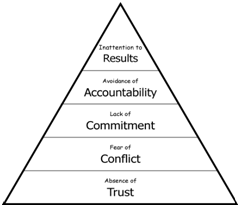
This month’s Fortiviti Book club pick was, “The Five Dysfunctions of a Team” by Patrick Lencioni.
Why we picked this book:
Patrick Lencioni says it best:
“Not finance. Not strategy. Not technology. It is teamwork that remains the ultimate competitive advantage, both because it is so powerful and so rare.”
Working together as a team is a critical component of achieving Fortiviti’s goals, and our clients’ goals.
What it’s About:
The 5 Dysfunctions of a Team tells a fable story of Decision Tech, a high profile start-up company located in Silicon Valley. Despite a team of top-notch and experienced executives, Decision Tech was beginning to fail in the first two years. The company’s new CEO, Kathryn Peterson is faced with the task of uniting a stumbling team of executives in order to save Decision Tech’s reputation of being the most unpleasant place to work in the Valley.
Patrick Lencioni reveals the five dysfunctions of what causes teams to struggle. He outlines a powerful model and provides actionable steps that can be used to build a cohesive and effective team.
The Model:
Dysfunction #1: Absence of Trust
When there is an absence of trust, team members cannot be vulnerable and honest about their faults with each other. Trust is the foundation of the pyramid, without this level of comfort among team members it is impossible to overcome the other four dysfunctions.
Dysfunction #2: Fear of Conflict
Teams with an absence of trust are incapable of engaging in open, unfiltered, debate over key issues in order to avoid hurting team members’ feelings. Great relationships, especially teams, depend on the ability to disagree in order to solve a problem.
Dysfunction #3: Lack of Commitment
Conflict gives team members an opportunity to share their ideas and opinions with each other. When people don’t share their opinions, they feel like they haven’t been listened to, making it difficult for them to commit to a clear plan of action. This will create a lack of confidence within the team.
Dysfunction #4 Avoidance of Accountability
Lack of commitment causes individual members to lose confidence in the team, therefore, they will hesitant to call their peers out on actions and behaviors that seem counterproductive to the overall good of the team.
Dysfunction #5 Inattention to Results
When team members don’t hold their peers accountable they are putting their individual goals ahead of the team. Inattention to results means the team has lost sight of the need for achievement and are only concerned about their personal success.
Quotes that inspired us:
“It’s as simple as this. When people don’t unload their opinions and feel like they’ve been listened to, they won’t really get on board.”
“Consensus is horrible. I mean, if everyone really agrees on something and consensus comes about quickly and naturally, well that’s terrific. But that isn’t how it usually works, and so consensus becomes an attempt to please everyone.”
“Members of great teams improve their relationships by holding one another accountable, thus demonstrating that they respect each other and have high expectations for one another’s performance.”
How We’re Applying What We Learned
We are going to work on building trust, admitting when we made mistakes, and let each other know when we need help. In staff meetings, we will challenge each other to find the best possible solution, and share our opinions.
To learn more about The 5 Dysfunctions, visit www.TheTableGroup.com
This blog post was written by Fortiviti Team member, Lisa Gillam
Posted in Fortiviti Book Club

